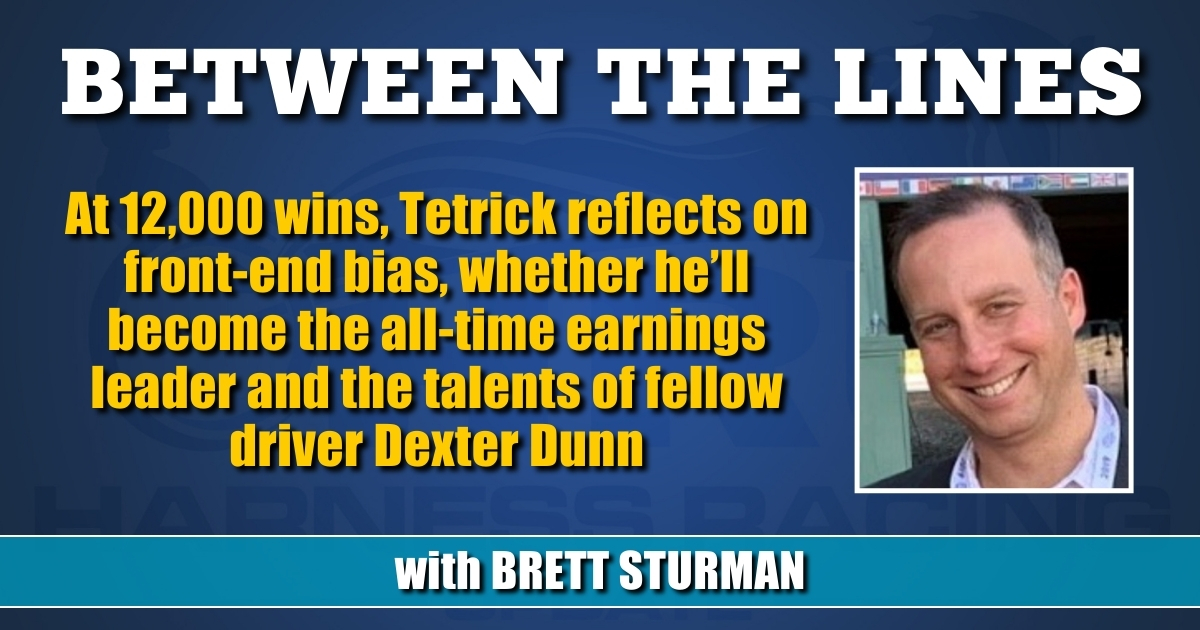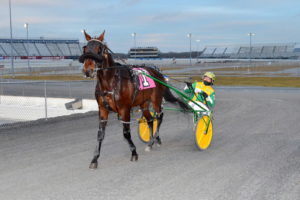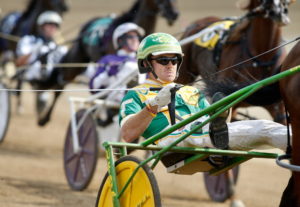At 12,000 wins, Tetrick reflects on front-end bias, whether he’ll become the all-time earnings leader and the talents of fellow driver Dexter Dunn
by Brett Sturman
In keeping with a frenetic pace covering the better part of the last 15 years, the early part of the season has been met with what seems like an annually-recurring milestone by driver Tim Tetrick. This past Tuesday at Dover Downs, Tetrick notched a win milestone with the American Ideal 3-year-old, Manone. For Tetrick it was career win number 12,000 and for Manone it was career win number 1.
The win came just a couple of weeks after what would have been 10 years to the date of Tetrick won his 6,000th career race in January, 2011 aboard a more well-known horse in St Elmo Hero. Tetrick has remained the youngest driver to hit every one of these win milestones going all the way back to win 2,000. Though his annual win rate has remained consistently at the top each year through his Rising Star year in 2007, he’s seen some changes through that time as a driver.
“I think it’s more of a front-end bias, even than it was just five years ago,” said Tetrick. “Horses have to be up close to win, especially when you look at the Meadowlands. Even when you race at Mohawk you used to be able to sit back and win races and now you better be close or you’re not going to be paid very well. You have to at least be close. It’s all about being up front and positioning, as well as making sure there’s not that one horse out of position to put you in a bad spot. It’s still very strategic but you have to be aggressive and be close.”
What Tetrick describes as there being more of a front-end bias than ever is consistent with the exceedingly record fast times that horses now post with ease and regularity. As horses continue to race faster and carry their speed longer, it’s that much more difficult to give away ground. It’s something that was observed repeatedly in last year’s Breeders Crown at Harrah’s Hoosier Park where horses that raced off cover were almost always outgained in the stretch by horses that all stayed to the inside.
“I wish there was a way that we could make winning from the back easier,” lamented Tetrick. “If you watch the Meadowlands, you’ll see horses get home in :25.4, :26 flat and lose ground in the lane. That’s just weird to me and that shouldn’t happen, but I don’t know what to do or how to fix that. Maybe we stop the slow second quarters because a lot of times, even at the Meadowlands you’ll see a :26 flat opening quarter and then :55.3 for the half, and that’s an absolute huge change. I used to make a living being second over, and now at the Meadowlands you’re better off sitting fourth on the rail than you are second-over and to me, being on a mile track, that doesn’t make sense.”
Though he currently sits seventh all-time in wins, Tetrick sits squarely in third all-time in earnings, with an eye on potentially reaching number 1. At over $228 million in career earnings, Tetrick trails only David Miller ($250 million) and the iconic John Campbell who retired just a few dollars shy of $300 million in the top spot. It’s a feat that seems do-able.
“It’s something that everyone tells me I’m the only one that’s got a shot at doing it,” Tetrick said. “I forget sometimes that I’m only 39 years old because sometimes it feels like I’ve been doing this for 40 years already. But I’m only 39 and so I think I’ve got at least another 10 years in me. At (a conservative) $5 million a year, that’s $50 million right there. Dave Miller is almost 60, and so if I can stay healthy for another 10 years I logistically have a shot at it.”
As far as his current health, Tetrick said, “I feel great. Like everybody I’d like to stay 20 pounds lighter but other than that I feel good. My mind is good, I’m happy and my family is wonderful. I just want better horses to drive, that’s the only thing I sometimes get mad about.”
In assessing his numbers through the years, Tetrick notes that his success has come largely without having a power stable such as Ron Burke or Nancy Takter to drive regularly for. Looking ahead to his 2021 opportunities, Tetrick will need to make up for the recently retired Shartin N.
“I really like Lyon’s Sentinel, but I keep thinking that she’s trying to beat Ryder’s mare (Party Girl Hill), which was one of the best 3-year-old mares I’ve seen, so it can be a tough game. I have In Range, the 2-year-old trotter last year for Melander that was second in the Breeders Crown. He overachieved last year but he’s very consistent.”
Tetrick earned nearly $10 million last year, including a four-month hiatus and not being able to race in Canada as one of the many obstacles that drivers last year had to face amidst life in a COVID-19 regulated world. “I could have gone to Canada, but for me, I don’t think mentally I could have done it being away from my family and giving up the everyday races,” said Tetrick. “And I didn’t have any major horses either that were going up. If I would have had a Captaintreacherous type of horse like how Yannick had Tall Dark Stranger, maybe it would have been a different story. It’s one of those things where we want to go. But you can’t give up everything here to go up there and hope that you do really good.”
While Tetrick has frequently sparred with Gingras amongst the driver leader board through the years, he’s seen a new rival emerge the last two years in the form of Down Under import Dexter Dunn. Two years ago, Dunn rode a successful Breeders Crown to Driver of the Year despite Tetrick boasting higher statistical numbers, but then last year Dunn was clear with over $11 million in earnings and Tetrick just shy of $10 million.
“What I think of Dex – he’s probably one of the best drivers that I’ve ever seen,” said Tetrick. “He just makes horses go very fast very easily, and he’s easy on them and smart. And he’s been a top driver his whole life, whether he drove as many of them in New Zealand or not, he’s was always a go-to catch driver.”
Another topic on which Tetrick has remained consistently adamant is he’d like to see judges take control of whipping rules.
“I’m not trying to bitch, but if judges had done a better job over the last five years then we wouldn’t even have this trouble with the whipping,” Tetrick said. “If someone is over-whipping their horse, then fine them! But if it’s coming down to the wire in a million-dollar race, you’re telling me that I can’t do anything but whip low at them? That’s hard for us, too. And then you’re going to have the gamblers tell us we didn’t try. I’m not asking at all to be able to beat a horse, but these horses are herd animals. They want to stay next to each other.”
Tetrick seems to be on a comfortable pace as he continues his climb to the top of the all-time driving leaders, but he continues to race in a highly-competitive driving environment. The next year or two may provide further clarity as to if or when he’ll get there.



















